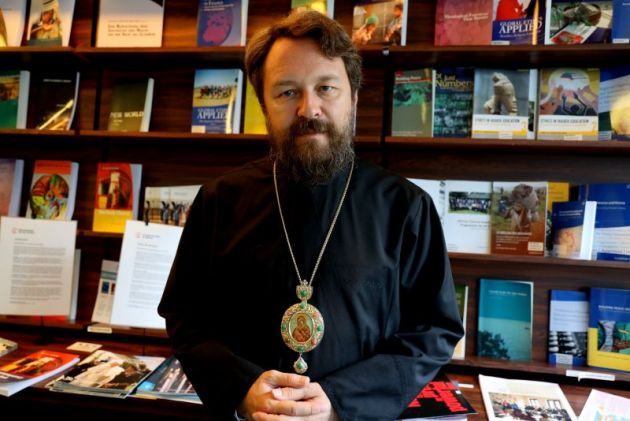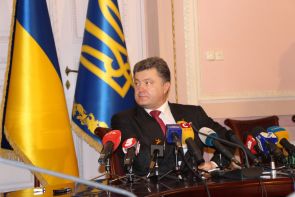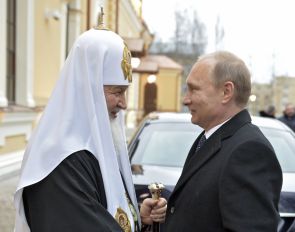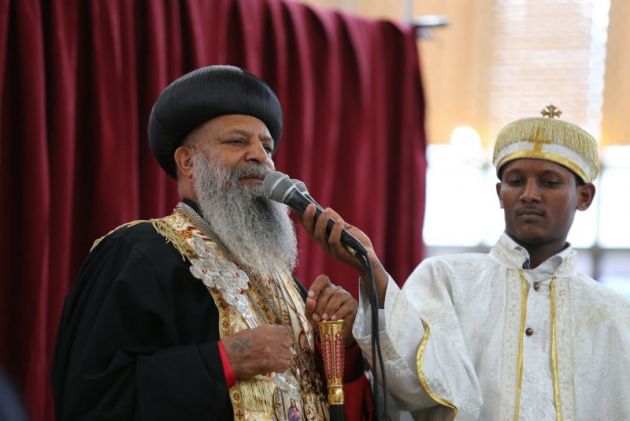Russian church leader says schism with Ukraine church is a global Orthodox issue

Russian Orthodox Metropolitan Hilarion of Volokolamsk says the creation of the Orthodox Church of Ukraine with the support of Bartholomew, the Ecumenical Patriarch of Constantinople, is illegal and it has created a global problem for Orthodox Christians.
Hilarion, a bishop of the Russian Orthodox Church, is chairman of the ROC's Department of External Church Relations and a permanent member of the Holy Synod of the Patriarchate of Moscow.
As the foreign affairs spokesman for the church, he spoke to Ecumenical News at the World Council of Churches on June 5 during a visit to Switzerland and raised the ROC's schism with the Istanbul-based Ecumenical Patriarchate due to its support for the Orthodox Church of Ukraine.
Before two of Ukraine's Orthodox churches united officially on Jan. 5, they had not been recognized by the Moscow Patriarchate and its Ukrainian Orthodox Church (Moscow Patriarchate), nor by the Ecumenical Patriarchate.
"It means that now we have a split - we have a schism. Until the end of last year, it was only in Ukraine, and it was so to speak a local problem. Now it has become a global problem for the Orthodox Church," said Hilarion in his interview.
He said that due to Bartholomew's action regarding the church in Ukraine, "The role of the Patriarch and his role in the worldwide orthodox church is no longer clear."
He was critical of the role of the former Ukainian president Petro Poroshenko and his visit to Istanbul in the process of setting up the new church and asserted that mixing politics with religion had cost the leader's job. .
An article for the European Council on Foreign Relations on May 30 described what happened as a "potentially seismic geopolitical event" noting what it said is the "Russian Orthodox Church's ostensible role as an important soft power arm of Russian foreign policy."
The issues entail multiple interpretations of Orthodox canonical law and the history and politics of Ukraine and Russia due to Moscow's great sway over its neighbor in the church and the polity over many centuries.
Hilarion sees no quick fix to the impasse and ruled out any external mediation, saying it must come from within the Orthodox church.
So, finding a solution could even run until the conflict on Ukraine's eastern border with Russia with separatist pro-Russian forces is resolved by the politicians along with the reality that unity in the new church has not yet been solved with one church decree and laws passed by the parliament in Kiev.
After Hilarion met the general secretary of the World Council of Churches, Rev. Olav Fykse Tveit on the same days as his interview, the WCC head told Ecumenical News, "The Russian Orthodox Church is our biggest member church."
He added, "We are very careful not to interfere in internal challenges and discussions within our member churches and the church families....They have to find solutions themselves."
Tveit said, "We express our hope that they will find a solution and that they will not divide the one Church of Christ."
ECUMENICAL PATHFINDER
Regarding the other side in the standoff, the WCC states on its website, "The Ecumenical Patriarchate was among the first to participate in the formation and development of the ecumenical movement and is particularly known for its Encyclical to 'All the Churches of Christ,' issued in 1920."
That latest tension involving the ROC and the Ecumenical Patriarchate began on Oct. 11, 2018.
That was when the Ecumenical Patriarchate announced that its Holy Synod had decided, "To renew the decision already made that the Ecumenical Patriarchate proceed to the granting of Autocephaly to the Church of Ukraine."
Hilarion said, "From our point of view it was an illegitimate move -- we call it non-canonical."
On Oct. 15, 2018, The Guardian newspaper had written, "The Russian Orthodox Church has announced it will break off relations with the Patriarchate of Constantinople in a religious schism driven by political friction between Russia and Ukraine.
"The Synod of the Russian Orthodox Church elected on Monday to cut ties with the Ecumenical Patriarchate of Constantinople, which is viewed as the leading authority for the world's 300 million Orthodox worshippers."
On Jan. 5 Ecumenical Patriarch Bartholomew signed what is known as a "tomos," a decree officially recognizing an independent Ukrainian Orthodox Church, in the presence of the then Ukrainian President Petro Poroshenko, who traveled to Istanbul for the occasion.
POROSHENKO'S ELECTION LOSS
Metropolitan Hilarion said he believed that Poroshenko had lost the presidential election in Ukraine last month due to his "interference" in church matters.

He did not speak of the close relationship in Russian between Moscow Patriarch Kirill and President Vladimir Putin and the Kremlin.
Metropolitan Hilarion said that the Ecumenical Patriarch did not have the powers to recognize a new autocephalous or independent church as that could only come at the request of the church seeking independence with the consensus of all the members of the Orthodox Church.

He said that the Ecumenical Patriarch was entrusted with coordinating the Pan Orthodox Council and a meeting did take place in Crete from June 18-26, but the Russian Orthodox Church chose not to attend.
At the end of the Holy and Great Council, the message of the churches attending said, "The key priority of the Council was to proclaim the unity of the Orthodox Church. Founded on the Eucharist and the Apostolic Succession of her Bishops, the existing unity needs to be strengthened and to bear new fruits."
Following Ukraine's presidential election at the end of April and the election of Volodymyr Zelensky Hilarion said, "I hope there will be positive changes because President Zelesnky does not seem interested in church affairs."
Daniel Hanson also stated that view writing in the U..S. international affairs publication The National Interest on May 28 that, "Volodymyr Zelensky is Ukraine's best chance for reducing church tension, promoting inter-confessional dialogue."
He noted that although the Moscow Patriarchate counts in its flock less than a fifth of Ukraine's Orthodox believers, it controls almost twice as many parishes as the new Orthodox Church of Ukraine and retains control over the country's most treasured religious sites.
This interpretation was different to when Hilarion addressed a June 1 conference on 'Russia – Ukraine – Belarus: A Common Civilizational Space?' that took place at the University of Fribourg, Switzerland and where the ROC spokesman was the keynote speaker.
There, according to the ROC website, Hilarion said the implementation of the unity church plan in Ukraine, "appeared not easy in a situation when the majority of the episcopate, clergy, and laity of the Ukrainian Orthodox Church did not support the idea of autocephaly."
CHURCH TREASURES
Hanson said in his piece that the most prized of the Moscow Patriarchate churches treasures is the Kiev Pechersk Lavra, a monastery complex which dates to the 11th century and is considered the holiest site in East Slavic Orthodoxy.
And the European Council on Foreign Relations noted that ,"just under one-third of the Russian Orthodox Church's 36,000 parishes are to be found in Ukraine, and their status is now in question."
In his piece Hanson wrote, "Ukrainians, whose history has been shaped by centuries of Polish rule, developed a sense of nationhood centered around Kiev. The Muscovites similarly lay claim to Kiev as the birthplace of their civilization.
"Moscow's acquisition of the church centered in Kiev in the late seventeenth century is understood by Russian historians as a reunion of the lands of Kievan Rus. For Ukrainian nationalists in the intellectual milieu of the late nineteenth and early twentieth centuries, Moscow was yet another foreign oppressor carving up the Ukrainian heartland."
This theme was visited at the June 1 conference at the University of Fribourg from a different perspective.
In answer to a question from the floor, Hilarion said, "Russia, Ukraine, and Belarus are one spiritual space. We contest neither national self-identification of the three Slavic nations, nor the boundaries of the independent states, but we will continue our struggle for the preservation of the unity of the Russian Orthodox Church which assures spiritual unity of all Orthodox believers living within its space irrespective of their national and ethnic belonging. Simple words of the holy elder Lavrenty of Chernigov' Russia, Ukraine, Belarus – all these are Holy Rus" remain topical and resound in the hearts of millions of people."
Hilarion did not seem optimistic that the latest schism in the Orthodox Church can be quickly resolved, but he noted that "in the Orthodox Church the concept of conciliarity is very important" and the ROC believes a "mechanism of conciliarity" should be implemented.
A bishop in Cyprus is playing a role in bridge building.
In the meantime, at the WCC's Ecumenical Center in Geneva the representative of the ROC, share neighboring offices and conversations, but the ROC "temporarily" will not participate in WCC committees in which a member of the Ecumenical Patriarchate is in a leading position.
Church schisms often look as if they can't be resolved. In July 2018, however, the Ethiopian Orthodox Tewahedo Church, the largest of the Oriental Orthodox Christian Churches and one of Christianity's oldest that has been in Africa since 330 AD, declared an end to a 27-year-old schism that had torn it apart.
